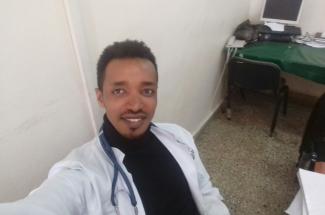The turning point that made me face my fear

When he was told that there was no help available for his stammer, Kirubel Workiye felt alone. Writing from Ethiopia, he explains how going to medical school made him realise that he had to find that help within himself.
My name is Kirubel. I am 28, I’m a medical doctor from Ethiopia and I started stammering at age 5.
Ethiopia is the third-poorest country in the world, so it isn’t difficult to imagine how much harder it is to live in this society as someone who stammers. The cultural perception of people who stammer here is that we are fearful, anxious or simply dumb, and that stammering is the result.
If you are lucky, you have family and friends who can build you back up. But if you are like me, you experience anxiety and depression frequently, and hope for a miracle.
The letters K, R, A, G were hard when I was a kid. What I remember most is the feeling when stammering. While I was in grade 6 our teacher set us an assignment to write an essay. After I finished, I showed it to my teacher. She was impressed by my writing skills at that age and requested that I present it to the class. I stood up to speak. My mouth gaped open and no sound came out. I started to feel so nervous. I heard stifling laughter from the back bench. There were many stories like these. During that time, I blamed God, asking why he created me that way. Throughout the years, I felt emotions of shame, envy and embarrassment that I routinely suppressed.
Getting into medical school
In my country it is everybody's dream to become a doctor. I was one of the top scorers in Ethiopia when I graduated from high school and so I got into medical school. That was the place that made me face my stammer. There were daily rounds where you had to present a report about your patient orally. One day when we had a round in a gynaechology ward, the professor asked, "Whose is this patient?" I raised my hand and said, "They are mine, professor." The professor asked, "What is your name?" I replied "My name is "K-k-k-k-Kirubel". I felt so much anger, rage and humiliation. In my mind I thought, 'if the physician can't understand me, who else could?'
I told myself that I should work on the shame, low confidence and low self-worth that accompanied the stammering instead of focusing solely on the mechanisms.
One day I went to see our psychiatry professor. I had hoped that he would understand and help me. He told me that there was only one speech and language therapist in the country and suggested I talk with her. The next day I went along and asked her to help. However, the therapist told me that she only worked with people who have a cleft lip. I felt then that I was alone in this world. I lost the courage to face my guilt, self-pity and loneliness.
That was the turning point that changed my mind. I tried many coping mechanisms but none of them worked well so I told myself that I should face my fear; that I should work on the shame, low confidence and low self-worth that accompanied the stammering instead of focusing solely on the mechanisms.
Graduating
I eventually graduated from medical school and I'm currently a general practitioner working in a governmental hospital. I speak all the time in the workplace, explaining disease progressions, treatments and prognoses with patients. I still stammer and still recognise the look of unfamiliarity on patients' faces. As much as possible, I try to talk things through with them slowly. In the near future, I am planning to take more specialist courses and study in radiology or dermatology. I like being a doctor — I believe that altruism, compassion, respect, loyalty, empathy, trustworthiness are etched into us.
I sometimes feel that my stammer has taken opportunities from me. But I should accept it. I believe that God has given me special talents. It's always been my dream to move abroad and live within a society where there is a stuttering association, so that I can share my feelings and make friends with people like me so that we can support each other. It's always my dream to help people who stammer, since I feel the pain. Stammering is part of me, that I cannot deny. I believe that I am more than stammering.
If you would like to write about your own experiences, see Submit Something For The Site or email editor@stamma.org to find out how.

































